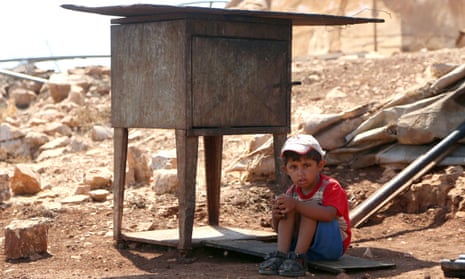Israel plans to demolish up to 13,000 structures, most of them on privately owned Palestinian land in the part of the illegally occupied West Bank under full Israeli military and civil rule, a UN report has found.
Between 1988 and 2014, Israel’s Civil Administration, the governing body that operates in the West Bank, issued 14,000 demolition orders, of which more than 11,000 are still outstanding and could result in the demolition of up to 13,000 structures owned by Palestinians in Area C, including houses, sheds and animal shelters, according to the report by the UN Office for the Coordination of Humanitarian Affairs (OCHA). In Area C, according to the Israeli human rights group B’Tselem, Israel retains control of security and land management and “views the area as there to serve its own needs”.
Nearly 4,500 of the demolition orders affected Palestinian Bedouins, who human rights groups argue are at the centre of Israeli plans to force them off their land to allow for expansion of Jewish settlements in the West Bank, which are illegal under international law.
The figures for the report were taken from the Israeli Central Bureau of Statistics and showed that in contrast to demolition orders against Palestinians, only 6,950 demolition orders had been made against illegal structures inside Jewish settlements.
According to Israeli Civil Administration data, Palestinians submitted 2,020 applications for building permits in Area C between 2010 and 2014 and only 33 (1.5%) were approved.
The report found the planning and zoning regime applied by the Israeli authorities, including the way land is allocated, “made it virtually impossible for Palestinians to obtain building permits in most of Area C”.
Less than 1% of Area C had been planned for Palestinian construction – even basic residential and livelihood structures, such as a tent or a fence, required a permit.
“Structures built without permits are regularly served with demolition orders. While only a minority of the orders issued are executed, these orders do not expire and leave affected households in a state of chronic uncertainty and threat.
“Where the orders have been implemented, they have resulted in displacement and disruption of livelihoods, the entrenchment of poverty and increased aid dependency,” the report found.
Of the 11,134 demolition orders, 570 were classified as ready to be carried out immediately – during the first half of 2015 the Civil Administration demolished 245 Palestinian structures in Area C.
Another 2,454 orders were on hold due to legal proceedings, while 8,110 demolition orders were classified as “in process”.
Area C covers 60% of the West Bank, which was temporarily divided into three parts – A,B and C – under the 1995 Interim Agreement on the West Bank and the Gaza Strip, signed by Israel and the Palestinian Liberation Organisation (PLO). Area C was supposed to be transferred to the Palestinian Authority by the end of 1998 but Israel has maintained military control of the area.
Today 300,000 Palestinians live in Area C, while nearly 360,000 Jewish settlers live in 135 settlements and 100 settlement “outposts”, which are illegal under international law. The outposts built outside the 135 core settlements are illegal under Israeli law but, according to B’Tselem, “the Civil Administration turns a blind eye to settlers’ building violations”.
Mohammed Saidi lives on the periphery of eastern Jerusalem with his two wives, 11 children and another 25 family members in two tin sheds that have been demolished and rebuilt more than four times in four years.
The Palestinian Bedouin family live in Az-Zayyem, inside Area C, farming goats and camels for milk. Saidi said his situation had become increasingly desperate, explaining that he faced poverty and a higher risk of displacement each time a demolition occurred.
The Saidi family have been told that the Civil Administration wants to move them to Azaria, a Palestinian town in Area B on the outskirts of Jerusalem.
“I can’t move because I need this area to feed by animals,” he said. “There is no grazing land for us in Azaria.
“For 70 years they have been trying to get Arabs off the land so the Jews can move in. We feel like we can’t live, it’s not something people feel in the west, only us here. When I tell Israeli forces that I have a family to provide for they don’t care.”
Each time a demolition is carried out on his land it results in about £1,000 worth of damage, Saidi said, adding that he had lost about 150 goats and 26 camels over the last four years and had to rebuild structures once a year.
“I applied for a permit in 2011 but I haven’t ever been granted one.”
The PLO general secretary, Saeb Erekat, said Palestinian officials were providing legal and financial support to the families.
This article was updated on 7 September to correct the number of buildings said to be under threat by the UN from 17,000 to 13,000, following updated information issued by the UN.





